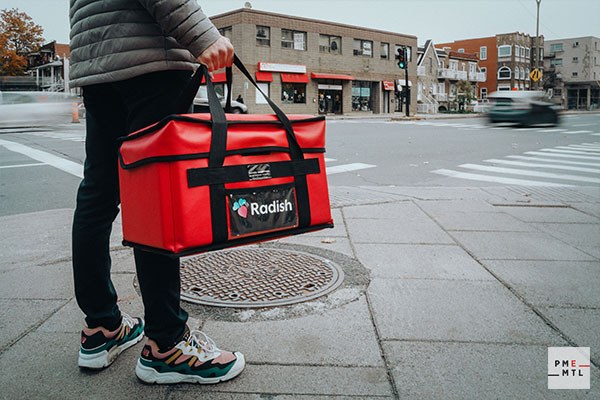Radish Rethinks Meal Delivery
Topic: Sustainable development
Step: Launching
Social economy 12 July 2022

At a time when, because of a pandemic, eating out has been replaced by home delivery of restaurant meals, a cooperative called Radish is proposing a business model that is fair to everyone involved.
In recent years, and especially since the beginning of the Covid crisis, meal delivery services such as Uber Eats, DoorDash, Deliveroo, Skip the Dishes and others have become part of the consumer landscape. This is not surprising, since according to a survey conducted in May 2019, one in three Canadians say they will use a food delivery app at least once in the next six months to order a meal.
This year, the value of home-delivered meals will reach up to US$136.4 billion worldwide.
According to various studies (including those by research firm Angus Reid Global and Dalhousie University), the value of home-delivered meals this year will reach up to US$136.4 billion worldwide. Domestically, 13.2 million Canadians will order US$2.5 billion worth of meals. And locally, 1.4 million Montréalers will have the equivalent of US$265 million worth of food delivered. The trend will continue, and by 2024 the value of restaurant meals delivered will be US$182.3 billion worldwide, US$3.5 billion domestically (17.4 million users) and US$641 million in Montréal (1.95 million users).
With such numbers, it is easier to understand why so many U.S. venture capital firms have invested in this sector in recent months. However, the picture is not all rosy, as more and more restaurant owners are demanding a fairer system as these services are eroding their already slim profit margins.
Growing up in small steps
Founded in late 2019, Radish, a Montréal-based organization, aims to carve out a place in this industry using a cooperative model in which everyone benefits, including delivery drivers, restaurant owners and users.
“The big players in this business are taking commissions as high as 35% on each delivery,” says Mansib Rahman, one of Radish's co-founders and managing director. “This greatly reduces the precariously low profit margin for restaurateurs. What we are proposing is a cooperative model, where profits are redistributed to members rather than enriching large companies.”
But how will Radish be profitable charging commissions at half the amount charged by the giants in the field, which themselves are still not profitable? “Uber Eats has received $24.5 billion in funding from various jurisdictions. Those creditors are looking for quick, high returns,” says Mansib Rahman. “This means huge commissions wherever Uber is present. We operate in a smaller market and don't necessarily want to expand everywhere as quickly as possible.”

Better commitment, better service
Cooperative members or employees show greater commitment than that demonstrated by delivery personnel working as subcontractors.
The cooperative model also has qualitative advantages, says the former data science team leader at Desjardins, where he learned about the coop concept. His argument is based on studies that have shown that cooperative members or employees show greater commitment to their company than delivery personnel working as subcontractors.
For one thing, those subcontractors only work during their free time, which does not always correspond to peak periods. “There are also many examples of slip-ups, such as lack of courtesy, meals received late or even eaten in part by hungry delivery persons, hot meals delivered cold because they are not placed in insulated bags, etc.” says Rahman. “While these incidents are not necessarily common, however, coop members are more present and available because they play a more significant role in the organization's success. In addition, our business plan includes a training component with extremely high standards.”
Industry Partner
Radish currently has a dozen member restaurants and eight delivery personnel. Its business plan does not target specific categories of establishments. In fact, its management even says it is ready to work with large chains that have their own fleet of delivery vehicles but whose technology is outdated.
The coop started out in the Villeray district at the end of 2019. Then, the organization quickly expanded its territory to include Plateau Mont-Royal and Côte-des-Neiges. Mansib Rahman has received calls from Victoria, British Columbia, Halifax, Nova Scotia, and London, Ontario, as well as from the Saguenay. Entrepreneurs from all over Canada want to implement his model across the country.
However, the entrepreneur remains cautious about rapid expansion. “We attach great importance to the specificities of each region. There are many things that vary from place to place: standards, regulations, density, and so on. Therefore, we want to work with local developers rather than simply have them duplicate the model being used in Montréal.”
In addition, Radish does not intend to limit itself to meal deliveries. In the longer term, the coop team wants to partner with restaurant owners on various levels. “For example, if we reach a certain volume of members, we could implement insurance programs and other employee benefits. From a technology standpoint, we could also help restaurateurs update their Web sites so they can focus on restaurant operations.”
How PME MTL made the difference for Radish
“I had met a member of the PME MTL team in a manufacturing job. We called on the group to obtain financing, which took the form of a $20,000 grant. On another level, PME MTL has proven to be a valuable ally in putting us in touch with potential investors and partners. You can't have networks in every field. But one of the strengths of PME MTL is its ability to find the right people, regardless of the sector, whether in the restaurant industry or for legal advice. PME MTL is a partner that allows us to move forward.”
--
Radish is supported by PME MTL Centre-Est
Articles
Des entrepreneurs qui font la différence
PME MTL vous propose des guides pratiques pour vous accompagner à chaque étape de votre parcours. Gagnez du temps avec des ressources conçues pour répondre à vos besoins spécifiques.





